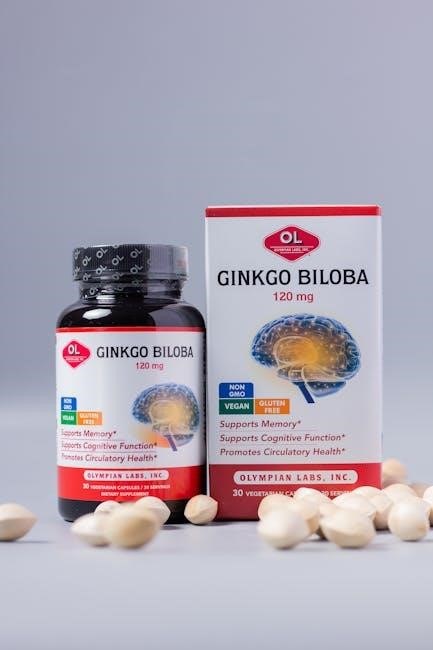Brain exercises are essential for maintaining cognitive function and enhancing memory retention. Regular mental workouts, such as puzzles, mindfulness, and physical activity, strengthen mental capacity and improve daily life.
The Importance of Brain Exercises
Engaging in brain exercises is crucial for maintaining cognitive health and improving memory. These activities strengthen neural connections, enhancing concentration, problem-solving, and mental agility. Regular mental stimulation can slow cognitive decline and reduce the risk of memory-related disorders. Brain exercises promote blood flow to the brain, nourishing it with essential oxygen and nutrients. They also foster neuroplasticity, the brain’s ability to adapt and grow, which is vital for learning and adapting to new information. Scientific studies highlight the benefits of consistent brain training in boosting memory retention and overall brain function. Incorporating these exercises into daily routines can significantly enhance quality of life and mental sharpness.
Types of Brain Exercises
Cognitive training, memory games, and physical exercises are effective brain exercises that enhance memory. Mindfulness practices further support cognitive health and mental clarity.

Cognitive Training and Memory Games
Cognitive training and memory games are powerful tools to enhance brain function. These exercises target working memory, attention, and problem-solving skills through activities like puzzles, brain teasers, and memory tests. Memory games, such as matching objects or recalling sequences, strengthen neural connections, improving recall and concentration. Cognitive training programs often incorporate structured tasks designed to challenge the brain, fostering mental agility and adaptability. Regular engagement in these activities can slow cognitive decline and boost overall mental sharpness. By leveraging scientific evidence, these exercises provide practical ways to improve memory and cognitive health effectively.
Physical Exercise and Its Impact on Brain Health
Physical exercise significantly enhances brain health and improves memory. Research shows that regular activity promotes blood flow to the brain, boosting cognitive function and neurogenesis. Aerobic exercises, such as walking or cycling, are particularly beneficial for increasing gray matter in the hippocampus, the region responsible for memory formation. Additionally, physical activity reduces inflammation and oxidative stress, which can impair brain health. Studies indicate that individuals who engage in regular exercise experience better memory retention and reduced risk of cognitive decline. Incorporating physical activity into daily routines is a simple yet effective way to support brain health and enhance memory capabilities over time.
Mindfulness and Meditation Practices
Mindfulness and meditation are powerful tools for enhancing memory and cognitive function. These practices focus on training the mind to stay present, reducing mental clutter and improving focus. Regular meditation has been shown to strengthen the hippocampus, the brain’s memory center, and promote neural plasticity. Techniques such as mindful breathing and guided meditation help reduce stress, which negatively impacts memory. Studies suggest that individuals practicing mindfulness experience better working memory and reduced mind-wandering. Incorporating meditation into daily routines can lead to improved concentration and overall brain health, making it easier to retain and recall information effectively. These practices are accessible and provide long-term benefits for memory enhancement.

How to Incorporate Brain Exercises Into Daily Life
Incorporating brain exercises into daily life can be simple and effective. Engage in activities like puzzles, memory games, or mindfulness practices to keep your mind active and sharp.
Creating a Daily Routine for Cognitive Improvement
A daily routine for cognitive improvement should include a mix of activities that challenge the brain. Start with morning memory exercises, such as recalling recent events or learning new vocabulary. Incorporate physical exercise, as it boosts brain health. Dedicate time for mindfulness or meditation to enhance focus. Use memory apps or puzzles during breaks to keep the mind active. Engage in complex tasks, like problem-solving or creative activities, in the evening. End the day with relaxation techniques to promote better sleep, which is crucial for memory consolidation. Consistency is key to seeing lasting improvements in cognitive function and overall brain health.
Using Memory Apps and Digital Tools

Memory apps and digital tools offer convenient and engaging ways to enhance cognitive function. Apps like Lumosity and Peak provide tailored brain exercises, such as memory games and puzzles, to target specific areas of improvement. These tools often include progress-tracking features, allowing users to monitor their cognitive growth over time. Many apps incorporate scientifically backed exercises, ensuring effectiveness. Additionally, digital tools like spaced repetition software can help with long-term retention of information. By integrating these resources into your routine, you can stay motivated and consistently challenge your brain, leading to noticeable improvements in memory and overall cognitive performance.

The Benefits of Brain Exercises
Brain exercises improve working memory, concentration, and cognitive function, enhancing overall brain health and daily performance through consistent mental stimulation and neural strengthening activities.

Enhancing Working Memory and Concentration

Working memory, the ability to hold and manipulate information, is crucial for cognitive tasks. Brain exercises like puzzles, memory games, and mindfulness practices improve concentration and mental clarity. Consistent practice strengthens neural connections, boosting problem-solving skills and focus. These activities enhance the brain’s ability to process information efficiently, leading to better academic and professional performance. Over time, improved working memory and concentration contribute to overall cognitive health, making daily tasks easier and reducing mental fatigue. Incorporating these exercises into a daily routine can significantly impact mental sharpness and productivity.
Scientific Evidence Supporting Cognitive Improvement
Research demonstrates that brain exercises significantly enhance cognitive function. Studies show that engaging in memory games, puzzles, and mindfulness practices improves working memory and concentration. These activities strengthen neural pathways, enhancing problem-solving skills and mental clarity. Regular cognitive training has been proven to slow cognitive decline and boost overall brain health. Scientific evidence supports the effectiveness of these exercises in improving memory retention and processing speed. By incorporating these practices, individuals can experience measurable cognitive improvements, leading to better performance in daily tasks and enhanced quality of life. The benefits are well-documented, making brain exercises a valuable tool for maintaining mental sharpness.

Measuring Progress and Improvement
Tracking cognitive improvement involves self-assessment techniques and periodic evaluations of memory and problem-solving skills. Regular tests and journals help monitor progress, ensuring measurable advancements in brain function.
Self-Assessment Techniques for Memory
Self-assessment is a crucial tool for evaluating memory improvement through brain exercises. Techniques include regular quizzes, memory journals, and setting personal goals to track progress. These methods allow individuals to identify strengths and areas needing attention. For instance, quizzes can test recall of new information, while journals document daily memory challenges and successes. Setting specific, achievable goals helps maintain motivation and provides a clear measure of improvement over time. By consistently applying these techniques, individuals can gain insights into their cognitive growth and adjust their brain exercise routines accordingly for optimal results and enhanced memory performance.

Tracking Cognitive Performance Over Time
Tracking cognitive performance is essential for monitoring progress in memory improvement. Regular assessments, such as memory tests and cognitive benchmarks, help identify areas of growth and refinement. Memory journals and digital apps can record daily achievements, providing a clear timeline of advancement. Setting measurable milestones ensures consistent evaluation, while maintaining detailed records allows for personalized adjustments to brain exercise routines. Over time, this systematic approach reveals patterns in cognitive function, highlighting strengths and areas needing attention. By consistently tracking progress, individuals can celebrate achievements and stay motivated to continue enhancing their memory and overall brain health effectively.

Downloadable Resources and Guides
Access PDF guides, workbooks, and toolkits for brain exercises, offering practical techniques to enhance memory and cognitive function. These resources provide structured plans and activities.
PDF Guides for Memory Enhancement Exercises
Discover comprehensive PDF guides designed to help you improve memory through structured exercises. These resources offer practical techniques, such as cognitive workouts, memory-building activities, and mindfulness practices, to enhance brain function. Many guides include step-by-step plans, puzzles, and strategies to boost focus and retention. They often incorporate scientific evidence and expert recommendations, ensuring effective and sustainable cognitive improvement. Whether you’re addressing memory loss or seeking to sharpen your mental acuity, these guides provide accessible tools for daily practice. Downloadable and easy to follow, they cater to all skill levels, making them ideal for individuals aiming to strengthen their memory and overall brain health.